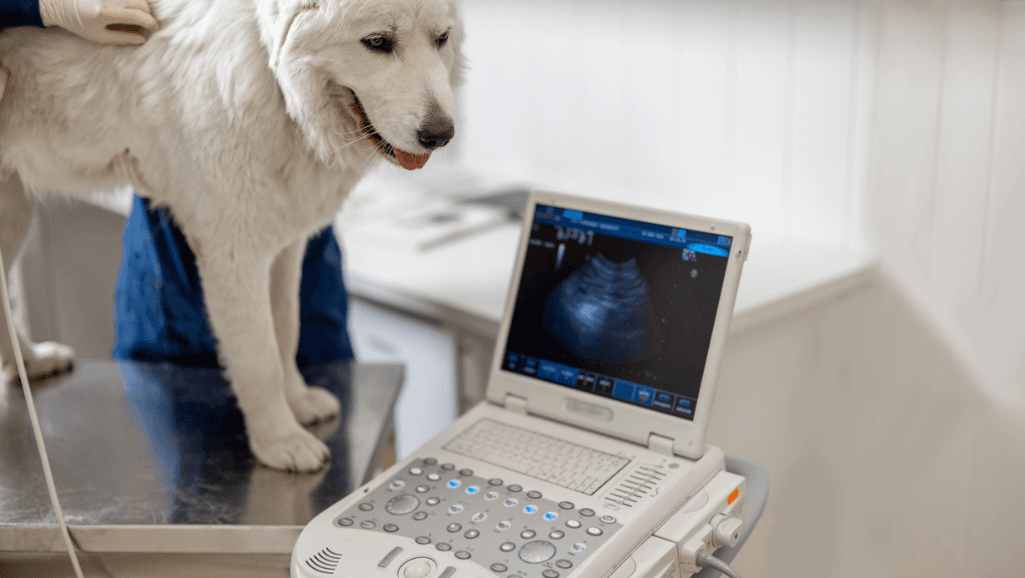Pancreatitis is a condition characterized by inflammation of the pancreas, a vital organ responsible for producing enzymes for digestion and hormones for glucose metabolism. It commonly occurs in dogs and can be acute or chronic. The exact cause is unknown, but it may be triggered by a fatty meal or corticosteroid administration. Clinical signs include nausea, vomiting, fever, abdominal pain, diarrhea, and decreased appetite. Diagnosis is made through laboratory testing, ultrasound studies, and clinical signs. Treatment involves resting the pancreas, administering analgesics and intravenous fluids, and feeding a low-fat diet. The prognosis depends on the severity of the disease, and long-term complications may include exocrine pancreatic insufficiency, diabetes mellitus, and adhesions between abdominal organs.
Key Takeaways:
- Pancreatitis in dogs is an inflammation of the pancreas, causing gastrointestinal symptoms and discomfort.
- The exact cause of pancreatitis in dogs is unknown, but fatty meals and certain medications are associated with increased risk.
- Common symptoms of pancreatitis in dogs include vomiting, abdominal pain, and decreased appetite.
- Laboratory tests, ultrasound, and clinical signs are used to diagnose pancreatitis in dogs.
- Treatment involves resting the pancreas, administering fluids and medication, and feeding a low-fat diet.
Causes of Pancreatitis in Dogs
Pancreatitis in dogs can have several causes, although the exact underlying trigger remains unknown. Understanding the factors that contribute to the development of this condition is crucial in preventing its occurrence and ensuring the well-being of our furry companions.
Dietary Causes of Pancreatitis in Dogs
Dietary indiscretion plays a significant role in pancreatitis cases in dogs. Consuming fatty or greasy foods can lead to inflammation of the pancreas. It is essential to be mindful of our dogs’ diet and avoid feeding them high-fat human food or table scraps to minimize the risk of pancreatitis.
Risk Factors for Pancreatitis in Dogs
In addition to dietary causes, several other factors can increase a dog’s susceptibility to pancreatitis. The following risk factors have been identified:
- Obesity: Overweight dogs are at a higher risk of developing pancreatitis.
- Hypothyroidism: Dogs with an underactive thyroid gland may be predisposed to pancreatitis.
- Severe Blunt Trauma: Traumatic events, such as accidents or injuries, can trigger pancreatitis in dogs.
- Diabetes Mellitus: Dogs with diabetes are more susceptible to developing pancreatitis.
- Certain Medications or Toxins: Specific drugs or toxins can contribute to pancreatitis in dogs.
- Genetic Predisposition: Some breeds have a higher likelihood of developing pancreatitis.
High-Fat Diet and Pancreatitis in Dogs
A high-fat diet poses a significant risk to a dog’s pancreas. Consuming a large amount of fatty food in one sitting can lead to pancreatitis, especially in dogs with a genetic predisposition or other risk factors. It is crucial to provide a balanced, low-fat diet for our dogs and refrain from feeding them excessive amounts of fatty food.
To fully comprehend the avoidance of feeding fatty foods to dogs, let’s take a closer look at a hypothetical example of the fat content in various common foods:
| Food Item | Fat Content per 100g (in grams) |
|---|---|
| Lean Ground Beef | 10g |
| Chicken Breast | 2g |
| Sausage | 27g |
| Peanut Butter | 50g |
| Salmon | 13g |
As you can see from the table above, certain foods, such as peanut butter or sausage, have considerably higher fat content compared to lean ground beef or chicken breast. It is crucial to be aware of the fat content in the foods we offer our dogs and make responsible choices to protect their pancreatic health.
Symptoms and Diagnosis of Pancreatitis in Dogs
Pancreatitis in dogs can manifest with various symptoms. Common signs include nausea, vomiting, fever, abdominal pain, diarrhea, and decreased appetite. During an episode of pancreatitis, dogs may assume a distinctive posture known as the “praying position.” They lift their rear end in the air and lower their front legs and head to the floor, as if in prayer.
To diagnose pancreatitis, veterinary professionals employ several methods, including laboratory testing, blood tests, and ultrasound studies. Laboratory tests may show elevations in white blood cells and pancreatic enzymes. Newer diagnostic tests, such as the SPEC-CPL test, offer greater accuracy in identifying pancreatitis in dogs.
Ultrasound studies play a crucial role in detecting pancreatic inflammation and peritonitis. These imaging procedures allow veterinarians to visualize the pancreas and surrounding structures, aiding in the diagnosis of pancreatitis.
Common Symptoms of Pancreatitis in Dogs:
- Nausea
- Vomiting
- Fever
- Abdominal pain
- Diarrhea
- Decreased appetite
Diagnosing Pancreatitis in Dogs:
| Diagnostic Method | Description |
|---|---|
| Laboratory Testing | Evaluates white blood cell count and pancreatic enzyme levels |
| Blood Tests | Measures pancreatic enzymes to indicate pancreatitis |
| Ultrasound Studies | Visualizes the pancreas for inflammation detection |
While these diagnostic methods provide valuable insights, it is important to note that some cases of pancreatitis may go undetected through these tests. Therefore, a diagnosis may rely solely on clinical signs and medical history.
Early recognition of symptoms and timely diagnosis are critical in effectively managing pancreatitis in dogs. By employing appropriate diagnostic techniques, veterinarians can provide accurate assessments and initiate appropriate treatment plans.
Treatment of Pancreatitis in Dogs
Treatment of pancreatitis in dogs is crucial for their recovery and well-being. The management of pancreatitis involves a combination of supportive care, medications, and intravenous fluids to address the inflammation and relieve symptoms.
Supportive Care:
- Resting the pancreas: In mild cases, it is essential to allow the pancreas to rest by withholding food until vomiting subsides. This helps to minimize further inflammation and promote healing.
- Dietary adjustments: Dogs who are not experiencing vomiting may be fed a low-fat, highly digestible diet during the recovery phase. This helps to reduce the workload on the pancreas and aids in the recovery process.
Medications:
- Analgesics: Dogs with pancreatitis often experience abdominal pain. Analgesics are prescribed to manage pain and discomfort.
- Anti-inflammatory drugs: Medications may be administered to reduce the inflammation of the pancreas and alleviate associated symptoms.
- Medications for vomiting and diarrhea: In some cases, dogs with pancreatitis may vomit or have diarrhea. Medications can be given to control these symptoms and prevent further complications.
Intravenous Fluids:
Administering intravenous fluids is an essential aspect of the treatment protocol for pancreatitis in dogs. These fluids help maintain the dog’s hydration, electrolyte balance, and nutritional needs. Special care is taken to ensure proper fluid management, especially in severe cases.
Dogs with severe pancreatitis may require intensive care in a veterinary hospital, where they receive aggressive doses of intravenous fluids and medications. Depending on the severity of the condition, dogs with pancreatitis typically stay hospitalized for two to four days to receive the necessary treatment.
Effective treatment of pancreatitis in dogs not only alleviates their immediate symptoms but also contributes to their long-term health and well-being. The management of this condition requires a comprehensive approach that includes early diagnosis, prompt veterinary care, and ongoing monitoring to ensure a favorable prognosis.
Prognosis and Long-Term Complications of Pancreatitis in Dogs
The prognosis for dogs with pancreatitis depends on the severity of the disease and the response to initial therapy. Dogs that present with shock and depression have a guarded prognosis, while mild forms of pancreatitis have a good prognosis with aggressive treatment. Most dogs recover without long-term consequences, but severe or repeated episodes of pancreatitis can lead to complications.
Exocrine Pancreatic Insufficiency (EPI) may occur if a significant number of cells that produce digestive enzymes are destroyed, requiring enzyme replacement therapy. Diabetes mellitus can result if cells that produce insulin are destroyed. In rare cases, painful adhesions between abdominal organs may develop. Management of these conditions is crucial for treatment success.
Proper monitoring and follow-up are essential in managing dogs with a history of pancreatitis to detect and address any potential long-term complications. Regular veterinary care, including bloodwork and physical examinations, can help identify and manage conditions such as EPI, diabetes, and adhesions.
Long-Term Complications of Pancreatitis in Dogs:
- Exocrine Pancreatic Insufficiency (EPI)
- Diabetes mellitus
- Adhesions between abdominal organs
Management of Long-Term Complications:
In cases of Exocrine Pancreatic Insufficiency (EPI), enzyme replacement therapy is necessary. Dogs with EPI require lifelong supplementation with pancreatic enzymes to ensure proper digestion and absorption of nutrients.
If a dog develops diabetes mellitus as a complication of pancreatitis, they may require insulin therapy to regulate their blood sugar levels.
In rare instances where adhesions between abdominal organs occur, surgical intervention may be necessary to alleviate any discomfort or complications associated with the adhesions.
Conclusion
Pancreatitis is a serious condition in dogs that requires prompt veterinary care. It is important for dog owners to be aware of the causes, symptoms, and treatment options for pancreatitis. Avoiding high-fat foods, providing a balanced diet, and monitoring for any signs of abdominal discomfort are essential preventive measures.
Early diagnosis and treatment can greatly improve the prognosis for dogs with pancreatitis. If you suspect your dog may have pancreatitis based on the symptoms discussed in this article, it is crucial to seek veterinary attention without delay. A veterinarian will be able to conduct the necessary tests and provide appropriate treatment.
Regular monitoring and management of potential long-term complications should always be prioritized for dogs with a history of pancreatitis. These complications may include exocrine pancreatic insufficiency (EPI), diabetes mellitus, or adhesions between abdominal organs. Working closely with your veterinarian to address any ongoing issues and provide necessary medications or therapies is crucial for the ongoing health and well-being of dogs with pancreatitis.
To ensure the best outcomes for your furry friend, remember to consult your veterinarian for guidance and care. Being vigilant, informed, and proactive in managing pancreatitis in dogs will help ensure their overall health and quality of life.





















